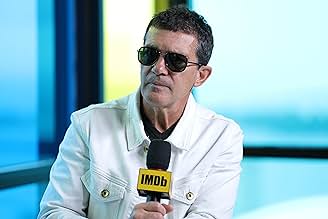IMDb रेटिंग
7.5/10
66 हज़ार
आपकी रेटिंग
एक फ़िल्म निर्देशक उन विकल्पों को याद करता है जो उसने अपने अतीत में किये थे, और कैसे उसका प्रभाव उसके वर्तमान पर पड़ता है, यह इस कहानी में दर्शाया गया है.एक फ़िल्म निर्देशक उन विकल्पों को याद करता है जो उसने अपने अतीत में किये थे, और कैसे उसका प्रभाव उसके वर्तमान पर पड़ता है, यह इस कहानी में दर्शाया गया है.एक फ़िल्म निर्देशक उन विकल्पों को याद करता है जो उसने अपने अतीत में किये थे, और कैसे उसका प्रभाव उसके वर्तमान पर पड़ता है, यह इस कहानी में दर्शाया गया है.
- 2 ऑस्कर के लिए नामांकित
- 71 जीत और कुल 179 नामांकन
फ़ीचर्ड समीक्षाएं
The story about the artistic crisis and depression. Once the noise of the glory goes away, there's nothing but emptiness and pain inside.
Almodóvar has created this autobiographical masterpiece during his darkest and the most lonely moments in his life. It's different from everything that the genius had shared with the world before.
Feeling of loneliness and pain in every scene, that makes a glory so unimportant and empty, when you have no one to share it with. The director made the audience hold the breath while he was speaking and sharing his most intimate secrets, his memories and regrets about the past.
Endless respect for Almodóvar for making this autobiographical movie so personal and sincere.
Endless respect for Almodóvar for making this autobiographical movie so personal and sincere.
It is a slow film, similar to life. I really enjoyed this movie, no one is clear what it is about until about and hour in. In simple terms is is film director who had lost his mojo because of the death of his mother and a back operations. He also begins to look back on his career and pivotal moments in his childhood. The flashback shots are perfectly and wonderfully capture the atmosphere of his young life while seamlessly interwoven with moments of present day.
Pain and glory is painful and glorious, as you'd except from a director who lives, suffers, enjoys and jogs his memory to find the small and grand moments of his human existence.
The acting of everyone was brilliant but limited so no Oscar here, Almodovar and Banderas are such a good match, the boy and the painter is such a delicate combination & the mother and the son in different moments of their lives, but mainly in the end, when they are both old. the dialogues are very meaningful, but movie as a whole had some profundity and was ravishingly shot as usual.
Pain and glory is painful and glorious, as you'd except from a director who lives, suffers, enjoys and jogs his memory to find the small and grand moments of his human existence.
The acting of everyone was brilliant but limited so no Oscar here, Almodovar and Banderas are such a good match, the boy and the painter is such a delicate combination & the mother and the son in different moments of their lives, but mainly in the end, when they are both old. the dialogues are very meaningful, but movie as a whole had some profundity and was ravishingly shot as usual.
A filmmaker (Antonio Banderas) deals with physical and mental ailments as he approaches old age, settling in to a sad kind of torpor as he reflects on life. People have come and gone and the real pain here seems to be quiet melancholy of regret, his body's (significant) issues notwithstanding. The film meanders a bit and suffers at times with pacing, but through his reflections and flashbacks, it tells a touching story about coming to peace with those we've known in life.
There's the filmmaker's mother (Penélope Cruz), who sent him to a seminary for most of his schooling because she had no money for a secular education, which led to him not learning much. In old age she dies alone in a hospital instead of in her home village, where he had promised to take her. (Oddly, the actor playing the elderly mother, Julieta Serrano, has blue eyes whereas Cruz's are brown, which was a little jarring to me). These are the things that swirl around in his mind as he still grieves over losing her.
There is also the actor from one of his popular films (Asier Etxeandia), who he had a falling out with decades ago, but who he reconnects with and is then introduced to heroin by. He casually tries it and then alarmingly we see him quickly hooked, which makes for what seemed like one of the longer subplots, which I wasn't all that interested in. There is an old lover who surfaces (Leonardo Sbaraglia), a man who disappeared out of his life and is now married with children, and the scene the two share is full of authenticity and warmth. He also recalls a time in childhood when he tutored a handyman for payment of services to his mother, and felt the first flush of desire when he saw him bathing.
I think Almodóvar was wise to draw a line at this last character not physically meeting him decades later, as it gave the film realism and a wistful bit of sentimentality. True to form, he also gives the viewer an explosion of primary colors, and there is certainly a lot of beauty on the screen. That kitchen, especially with its bold red cabinets, made me wonder if such a space would be too loud to live in, but later I read that it was modeled on Almodóvar's own home. I also loved the little touch of the Cruz's character and her friends breaking in to a light song while washing their clothes in the river. Nothing "big" happens here, but in its quiet way, it reflects the director, and his pain and glory in life.
There's the filmmaker's mother (Penélope Cruz), who sent him to a seminary for most of his schooling because she had no money for a secular education, which led to him not learning much. In old age she dies alone in a hospital instead of in her home village, where he had promised to take her. (Oddly, the actor playing the elderly mother, Julieta Serrano, has blue eyes whereas Cruz's are brown, which was a little jarring to me). These are the things that swirl around in his mind as he still grieves over losing her.
There is also the actor from one of his popular films (Asier Etxeandia), who he had a falling out with decades ago, but who he reconnects with and is then introduced to heroin by. He casually tries it and then alarmingly we see him quickly hooked, which makes for what seemed like one of the longer subplots, which I wasn't all that interested in. There is an old lover who surfaces (Leonardo Sbaraglia), a man who disappeared out of his life and is now married with children, and the scene the two share is full of authenticity and warmth. He also recalls a time in childhood when he tutored a handyman for payment of services to his mother, and felt the first flush of desire when he saw him bathing.
I think Almodóvar was wise to draw a line at this last character not physically meeting him decades later, as it gave the film realism and a wistful bit of sentimentality. True to form, he also gives the viewer an explosion of primary colors, and there is certainly a lot of beauty on the screen. That kitchen, especially with its bold red cabinets, made me wonder if such a space would be too loud to live in, but later I read that it was modeled on Almodóvar's own home. I also loved the little touch of the Cruz's character and her friends breaking in to a light song while washing their clothes in the river. Nothing "big" happens here, but in its quiet way, it reflects the director, and his pain and glory in life.
After having seen this film, I overheard the conversation of the couple next to me while the end credits rolled over the screen. 'So beautiful! And so much red!'. It was exactly what I was thinking. Red is the colour of this film. The scenes without anything red in it, are sparse.
The abundance of the colour red proves how meticulously Pedro Almodovar has taken care of every small detail in this film. The result is a feast for the eyes. But the film is not only very stylish, it is also very emotional - as is often the case in Almodovar's work.
The story is about a film director looking back on his work and his life, in which pain and glory each play a part. His life is miserable, his body is in pain and his career seems to be in decline. But when a film museum asks him to discuss a film he made 30 years ago, he learns to see things in a different perspective. He resolves a bitter conflict, meets a long lost former lover and reflects on the death of his mother. The themes are tied together by a clever script, with long flashbacks.
It's interesting to know to what extend this story was inspired by Aldomovar's own life and career. When an acclaimed film maker makes a film about an acclaimed film maker, this is an inevitable question. The imaginary masterpiece from 30 years ago, with a poster showing a tongue sensually licking the lips, could very well have been one of Almodovar's own exuberant movies from his early period.
Some typical Almodovar-themes are present in this film, like the mother-son relation, and the catholic faith. Also, the two leads, Antonio Banderas and Penelope Cruz, are present in the casts of several of his films. In every aspect, this is a quintessential Almodovar movie.
(Antonio Banderas won Best Actor award at the Cannes festival because he played Almodóvar).
I know there are tons of autobiographical films about a painful past and unfinished business (in Hollywood), but Almodóvar reflects his own past very well.
Almodóvar's "Pain and Glory" is very beautifully shot and well-described autobiographical film about emptiness, recollection of the past and most importantly, about salvation. The film also describes well pain, sadness, self discovery, forgiveness, regret, all these feelings that the director is going through.
Without spoiling anything, the story is about a known Spanish director, Salvador Mallo, who reflects his choices made in his life (from his childhood to his cinema career) as past and present come crashing around him.
Almodóvar wanted to represent his life and memories from his life, bathred boundless desire to live and love that guide us to forgiveness with oneself and others. He's entering the stage where he's no longer have inspiration, but he uses his life as a cinema fiction. Almodóvar reflects mostly to his past as something painful and unfinished. Only with the return of ourselves, with coping with the painful past, we have the possibility to rehabilitate ourselves. As I mentioned, Antonio gives a great performance as a reconstructed fella with a passion.
I think whoever watched Almodóvar's previous pieces would enjoy from his new personal film about a person's valuable soul.
I know there are tons of autobiographical films about a painful past and unfinished business (in Hollywood), but Almodóvar reflects his own past very well.
Almodóvar's "Pain and Glory" is very beautifully shot and well-described autobiographical film about emptiness, recollection of the past and most importantly, about salvation. The film also describes well pain, sadness, self discovery, forgiveness, regret, all these feelings that the director is going through.
Without spoiling anything, the story is about a known Spanish director, Salvador Mallo, who reflects his choices made in his life (from his childhood to his cinema career) as past and present come crashing around him.
Almodóvar wanted to represent his life and memories from his life, bathred boundless desire to live and love that guide us to forgiveness with oneself and others. He's entering the stage where he's no longer have inspiration, but he uses his life as a cinema fiction. Almodóvar reflects mostly to his past as something painful and unfinished. Only with the return of ourselves, with coping with the painful past, we have the possibility to rehabilitate ourselves. As I mentioned, Antonio gives a great performance as a reconstructed fella with a passion.
I think whoever watched Almodóvar's previous pieces would enjoy from his new personal film about a person's valuable soul.
क्या आपको पता है
- ट्रिवियाJulieta Serrano and Antonio Banderas already played mother and son, more than 30 years before, in another two movies by Pedro Almodóvar: Mujeres al borde de un ataque de "nervios" (1988) and Matador (1986)
- गूफ़The eye color of Penelope Cruz (Antonio's young mother) are brown while the old mother's are pale blue. In the very last scene of the film, it appears that Penelope Cruz is an actress who plays Antonio Banderas's young mother while filming a scene in front of him.
- भाव
Salvador Mallo: The nights that coincide several pains, those nights I believe in God and I pray to him. The days when I only suffer a type of pain I'm an atheist.
- कनेक्शनFeatured in 2020 Golden Globe Awards (2020)
- साउंडट्रैकA tu vera
Written by Juan Solano (as Juan Solano Pedrero) and Rafael de León (as Rafael de Leon Arias de Saavedra)
Performed by Rosalía and Penélope Cruz
टॉप पसंद
रेटिंग देने के लिए साइन-इन करें और वैयक्तिकृत सुझावों के लिए वॉचलिस्ट करें
- How long is Pain and Glory?Alexa द्वारा संचालित
विवरण
- रिलीज़ की तारीख़
- कंट्री ऑफ़ ओरिजिन
- आधिकारिक साइटें
- भाषा
- इस रूप में भी जाना जाता है
- Đau Đớn Và Vinh Quang
- फ़िल्माने की जगहें
- Paterna, Valencia, Comunidad Valenciana, स्पेन(underground dwelling)
- उत्पादन कंपनियां
- IMDbPro पर और कंपनी क्रेडिट देखें
बॉक्स ऑफ़िस
- US और कनाडा में सकल
- $45,67,338
- US और कनाडा में पहले सप्ताह में कुल कमाई
- $1,52,636
- 6 अक्टू॰ 2019
- दुनिया भर में सकल
- $3,73,59,689
- चलने की अवधि1 घंटा 53 मिनट
- रंग
- ध्वनि मिश्रण
- पक्ष अनुपात
- 1.85 : 1
इस पेज में योगदान दें
किसी बदलाव का सुझाव दें या अनुपलब्ध कॉन्टेंट जोड़ें



![Tráiler 2 [OV]](https://m.media-amazon.com/images/M/MV5BYWViMTBkNDgtOGM3Yi00YmFhLTk2OTItYWY5ZDJlODg0NGY4XkEyXkFqcGdeQXRyYW5zY29kZS13b3JrZmxvdw@@._V1_QL75_UX500_CR0)
![Tráiler [OV]](https://m.media-amazon.com/images/M/MV5BOGQ1YmRmNjUtMjVmYy00NDAxLThhNmEtMGNjNTIzZmQ2ZTcxXkEyXkFqcGdeQXRyYW5zY29kZS13b3JrZmxvdw@@._V1_QL75_UX500_CR0)





































